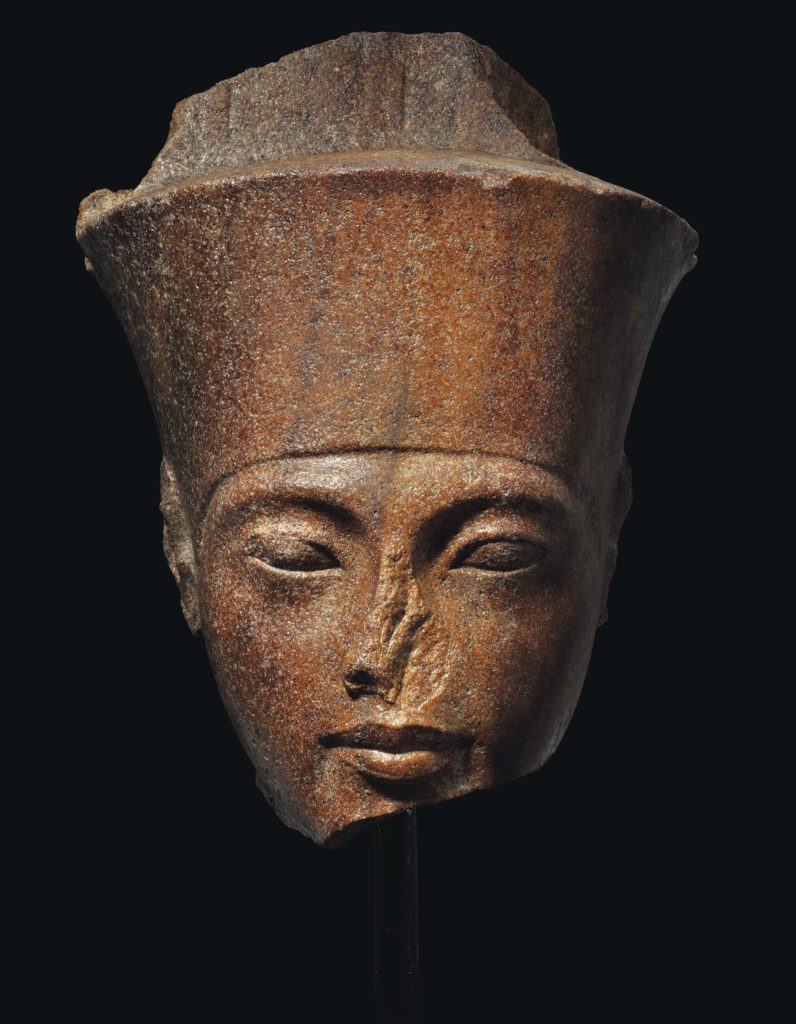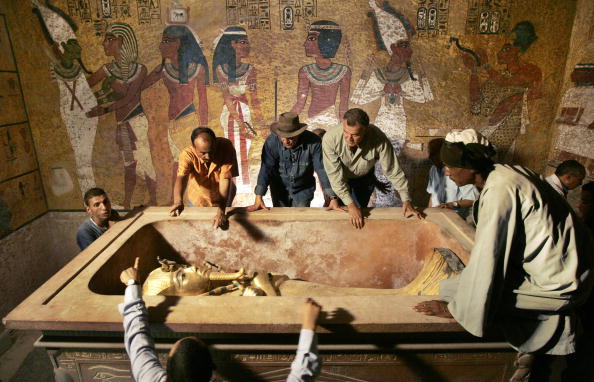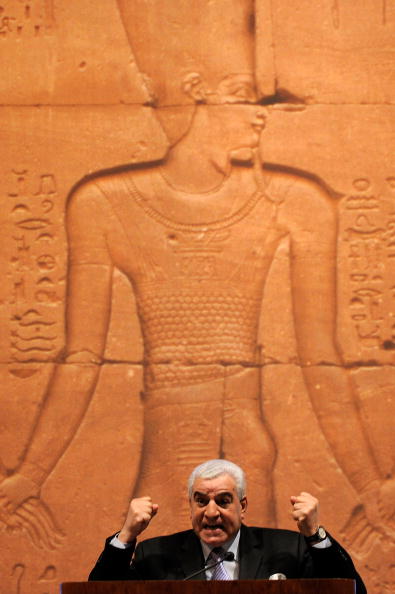Described as Egypt’s Indiana Jones, world-famous archaeologist Zahi Hawass has held the keys to Egyptian Antiquities for 30 years. Throughout his illustrious career, Dr Hawass has made a number of major discoveries, including the Tombs of the Pyramid Builders at Giza and the Valley of the Golden Mummies at Bahariya Oasis. The former Minister of Antiquities and Director of Excavations at Giza, Saqqara, Bahariya Oasis, and the Valley of the Kings received his Ph.D. in 1987 from the University of Pennsylvania, where he studied as a Fulbright Fellow. He has written over 40 popular and academic books and more than 150 scholarly articles on his excavations. Known for his charisma, dynamism, and ability to reach out to the public, he has sparked global interest in ancient Egypt, tirelessly advocating for archaeological exploration and the preservation of Egypt’s precious and extraordinary ancient heritage.
Earlier this month, Egypt found itself involved in one of the most controversial auctions in years when it asked Interpol to help track down a 3,000-year-old sculpture of the famed boy Pharaoh Tutankhamun after it was sold by Christie’s in London for almost £5 million to an anonymous buyer, despite Egypt warning it was probably stolen in the 1970s. A veteran of repatriation campaigns, Dr Hawass is at the forefront of the debate. In his interview Majalla, he passionately discussed Egypt’s right to demand the return of the artifact and why he continues to campaign for the retrieval of Egypt’s stolen treasures, including some of the country’s most prized antiquities such as the iconic Rosetta Stone, long-displayed in the British Museum in London.
Many Egyptian artifacts have been sold at auction houses such as Christie’s and Sotheby’s in recent years. Why did the Egyptian authorities decide to take action over this sale?
When I was the Minister of Antiquities, I returned six thousand artifacts. But seeing Egypt’s most famous pharaoh, the “boy king” Tutankhamun on sale is something that deeply upsets us all - including government officials and the public. Christie’s lacks ethics - the auction house asked us to provide evidence that this item had been stolen, but why did they not provide the documents to prove that it was exported from Egypt legally? It is clear that they do not have such documents.
Christie’s have told many lies. They claimed that the sculpture was owned by Prinz (Prince) Willhelm von Thurn und Taxis, but when Live Science asked his family, they said they Wilhelm never owned the sculpture. I believe that this Egyptian head of the god Amun with features of the Pharaoh Tutankhamen was looted from [Luxor’s] Karnak temple. We are now investigating the sculpture’s provenance by looking through all the archives of photographs taken in the temple.
What bothers us the most is how the British government can allow this piece to leave the country without evidence of its legal export from Egypt. The UK has very close relations with Egypt. There are British archaeological expedition teams working in Egypt. In a case like this, we could stop their work and this would be bad for them. We need the help of the British authorities. We need them to cooperate with us. I am a member of Egypt’s National Committee for Antiquities Repatriation (NCAR) and when met on July 8 in Egypt we gave the authority to the Egyptian ambassador in London to instruct a law firm in the UK to prohibit the export of the artifact before the Egyptian authorities have investigated how it left Egypt. It is very bad there is no law in place that says that Christie’s must provide proof that the artifacts left Egypt in a legitimate manner.
So is there evidence that the numerous artifacts sold in recent years in Christie’s, Sotheby's and other auction houses were legally exported from Egypt?
Before 1983, if you had a statue that you wanted to export out of Egypt, you could do so legally. If you could prove that the artifact was not stolen, you would go to the Cairo museum and they would grant you authorization with an official stamp. Also at the time, foreign archaeologists received 50 percent of the artifacts found in their excavations through an official agreement. Therefore, not everything that is on sale is illegal. Antiquities were on sale in Egypt until 1983 when Cairo passed the Law on the Protection of Antiquities which prevented any artifacts from leaving the country. You have to look only at specific artifacts like the head of Tutankhamun which I am certain left Karnak in 1970 and this is why it has to be returned to Egypt.

You have said that Egypt will fight for the return of the head of King Tut. What real power do you have? You’ve mentioned that the Egyptian government could ban British excavations in Egypt, what other actions can be taken?
This is the most important thing. When we met last week, the committee said we can stop their work but we are not going to do that if the British government show goodwill and try to cooperate with us. We don’t even know who bought the piece.
Are you optimistic that King Tut will return home?
No, I am not optimistic at all because Christie’s always behaves badly and the day the sculpture of King Tut - the famous pharaoh who captured the hearts of people all over the world - was sold was a black day in the history of Egyptian archeology and Christie’s name will be written in history in black.

Do you think that this issue could impact the cultural relationship between Egypt and the UK?
Yes - if they allow a piece like this to leave the country without proof that the artifact left Egypt in a legitimate manner. We have asked them for the evidence. That is what we need from them. If they do not answer us or cooperate with us, this will affect the archaeological relationship between us for certain.
Have the British government responded?
No. Not yet.
How has this news been received by the Egyptian public and to what extent do Egyptians give serious thought to the issue of artifacts and national treasures nowadays?
The public is very upset and this is the first time that I have seen all the Egyptian people supporting the Ministry of Antiquities, They are unhappy with Christie’s for selling this precious artifact for 6 million dollars within 10 minutes. That is a shame on them.
Egypt has stepped up its fight against the sale of looted antiquities worldwide. You've personally repatriated thousands of artifacts in your career. Can you tell us about some of the important artefacts that you've returned to Egypt?
I have recovered many important artifacts but the three most important artifacts that I am after are the Nefertiti bust at the Neues Museum in Berlin, the Dendera Zodiac at the Louvre Museum in Paris and the Rosetta Stone at the British Museum in London - all of which left Egypt illegally. When I asked the three museums to loan these artifacts for three months for the opening of the Grand Museum, they all refused. As a result, we started a committee and we discovered that the bust of Nefertiti left Egypt illegally. We then sent a letter to the Neues Museum requesting that they return Nefertiti to Egypt. They told us that the letter needed to be signed by the minister but when I became the Minister of Antiquities minister in 2011, the revolution started shortly after and everything stopped.
But I will tell you a story about four of the stolen artifacts that I returned. Four reliefs were stolen from a tomb in the west bank in Luxor. I began to search for them and discovered that the Louvre in Paris had bought them. I wrote a letter to the Louvre requesting that they return them and they agreed, but nine months later they still hadn’t given them back. Later, when the Louvre applied to work at Saqqara in Giza, I stopped their expedition. The French President at the time, Nicolas Sarkozy, called the former Egyptian President Hosni Mubarak to complain about what I did, but when I explained to Mubarak why I took the decision, he agreed that I did the right thing. The Louvre later returned the pieces to Egypt. We have to be strong. Each of the six thousand artifacts that I returned to Egypt has their own story.
Do you think that some of Egypt’s most precious artifacts such as the Rosetta Stone and the Nefertiti Bust will ever return to Egypt?
Yes, I think they will because of the developments happening all over the world. France’s President Emmanuel Macron said that it is time for the return of looted African artifacts acquired as a result of colonialism. The Dutch returned 33 status to Nigeria. The Greek government is asking the British Museum to return their Elgin Marbles. Now it is time for us to demand the return of the Rosetta Stone, the Nefertiti Bust and the Dendera Zodiac. We have strong scientific relations with these museums. We are not asking for every artifact to come back, we’re only asking for artifacts that have been stolen recently and these unique artifacts. The Rosetta Stone is the icon of the Egyptian identity. Their homeland should be Egypt, not a foreign country.
One of the counterarguments made against repatriation is the issue of safe-keeping as some question whether artifacts will be secure and preserved in the countries they are returned to. What do you say to that argument?
This is absolute rubbish. Our museums today are better than any museum in England. The Grand Museum which is due to open next year will be the best museum in the world. Our museums are more secure than any museum in the world and our antiquities are completely secure. To say that they could guard them better than us is just not true. Egypt is a very stable country. What happened during the revolution could happen in London or New York, or in any place in the world. I took part in a debate at the Oxford Union and the side arguing against me made this same point. But after hearing my argument, all of the students voted for my side because it is fair.

The looting of artifacts escalated following the upheaval of the revolution in 2011. Are you able to estimate the scale of stolen antiquities?
No, we can’t know, people were digging everywhere. All the artifacts that were exported out of Egypt during the revolution were excavated illegally. Modern Egypt is built on top of ancient Egypt so people could dig in the courtyard of their homes and find antiquities. Therefore most of what you see on sale now were likely unearthed through illegal excavations. This is why I am asking UNESCO to consider passing a law that compels every auction house to verify the provenance of every item they sell. We need to change the law.
Is tomb-raiding still a problem today?
No. After President Abdelfattah el-Sisi came into power, Egypt became stable and safe and the country’s antiquities are protected and preserved by the Egyptian police and the Ministry of Antiquities.
What excavation projects are you currently working on that we can look forward to hearing about in the near future?
I am excavating in the Valley of the King. I stopped for the summer but I will start on again September 1. I cannot talk about this at the moment as I have not officially announced any discoveries yet.
Also in September, I am starting the second part of the Egyptian Mummy Project where we are scanning 20 royal mummies using CT imaging and DNA testing.
When will tourism return to normal in Egypt?
Tourism is back with power. 9000 Americans came to visit me in the last five years. I believe that this year tourism will be back to 2010 peak levels.









